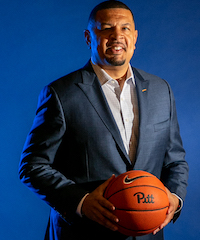I got a chance to work with him for seven years and to be around him all the time, so I saw all the things he did to help people, to assist people, that no one really knew about. They weren’t publicized, he just did it out of the kindness of his heart.
That’s who he is at the core—he’s someone that genuinely cares about people, that wants to help people. I think a lot of it comes from his upbringing, and the influence his mother had on him. Whether it was fellow coaches who were going through difficult times, hard seasons—just the rigors of coaching—he would reach out to them. Whether it was a young kid or an adult or someone that was dealing with some kind of health crisis or something difficult, he would call or write. He’s one of the few people that still did handwritten letters or handwritten notes.
He was constantly doing those things that most people didn’t know about. I would hear him on the phone at times. I would see him reaching out and doing those things, and I saw the impact that it had on the people that he was helping.
He’s always been that for me, ever since I decided to go to Duke as a player. I think any of us, as former players, guys who played for him, you knew that he always had your back. If there was anything you needed, he would always be there to help and to assist. I certainly went through things, [such as] when I was fired at [The University of] Oklahoma]. I had some health issues myself that he was right there for. What we as a family, and me specifically, were going through with my dad’s illness and his death, he was the guy who was right there all the time. That’s not singular to me. I saw him do that with a lot of former players.
Everyone has seen and read about who he is as a coach and what he accomplished as a coach, but behind that is an even better man.
He’s made an impact with coaching and with leadership, and that’s given him a platform, but behind all that is the impact he’s had as a human being, on other human beings. You look at what he did and what his family did with the Emily K Center. What he’s done in that community to give people like him that didn’t have opportunities, that don’t have some of the same luxuries as others may have, but to give them opportunities to attend college—he’s a direct example of what college can do, how it can completely change the trajectory of your life. He was someone who didn’t want to go to West Point—it was something that his mom made him do. What he’s done with the Emily K I think is one of his greatest accomplishments.

Share your comments
Have an account?
Sign in to commentNo Account?
Email the editor